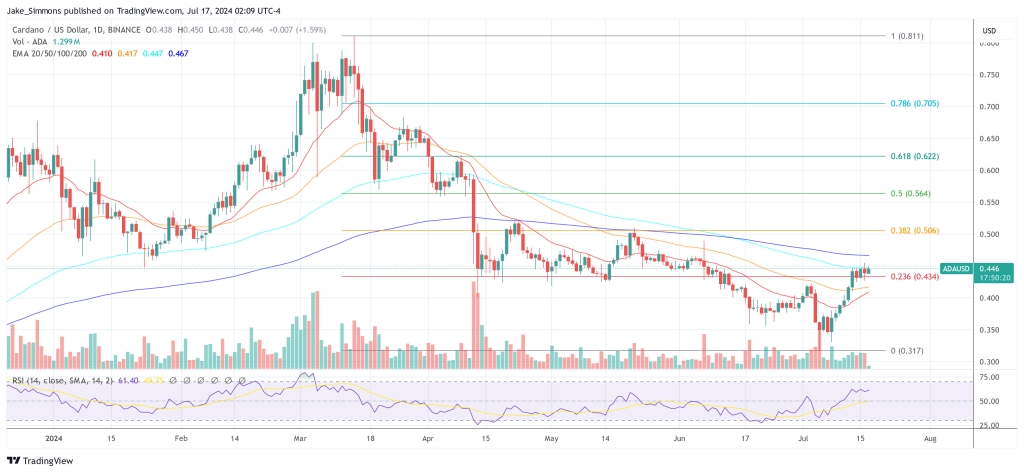As a seasoned analyst with extensive experience in blockchain technology and its applications, I have closely followed the ongoing debate surrounding Elon Musk’s call for help to address account hacks and scam bots on Twitter, and Charles Hoskinson’s proposal to integrate Decentralized Identifiers (DIDs) into Twitter’s framework.
On Tuesday, July 16, Charles Hoskinson, the founder of Cardano‘s blockchain platform, made a public proposal to Elon Musk to help tackle the increasing problem of hacked accounts and scam bots on X (previously known as Twitter). Hoskinson suggested implementing Decentralized Identifiers (DIDs) into X’s infrastructure. This concept is backed by organizations like the World Wide Web Consortium (W3C).
What The Cardano Founder Offers Musk
Hoskinson contacted Elon Musk directly through a public post, expressing his belief that Decentralized Identifiers (DIDs) could resolve the current issues. He offered to integrate DIDs into the platform at no cost. This proposal came following the high-profile security breaches of Ben Goertzel’s account on SingularityNet, where the CEO had to apologize for spreading scam links to his followers.
The discussion surrounding Decentralized Identifiers (DIDs) and their possible integration into X’s platform has sparked a wider argument concerning the true meaning and execution of decentralized identity solutions. Timothy Ruff, General Partner at Digital Trust Ventures, expressed concern over the suggestion, stating that “if ‘DIDs’ refer to decentralized identities (which they don’t), and they exist on a blockchain, they are not truly decentralized and should be kept out of X.”
In clarification, Hoskinson stressed that the technology aligns with established standards and is blockchain-neutral. He made it clear that his suggestion wasn’t limited to Cardano; instead, he referred to the W3C standard, and there’s a blockchain-agnostic Hyperledger project for issuing and managing decentralized identities (DIDs), anonymous credentials, and other identity stack components. To comply with regulatory requirements as an MSB (Money Services Business), X needs an advanced identity solution.
He continued to advocate for incorporating this technology into X, stating that it would significantly boost security, simplify access control, eliminate bots, and smooth out compliance processes. He emphasized, “It’s written in Scala, so implementation is straightforward. I’ll take care of it at no cost. I don’t intend to sell blockchain here; rather, I want X to excel as it serves as crucial public infrastructure.”
As a crypto investor, I understand Hoskinson’s background in the industry, but I want to express my apprehension about the reliance on blockchain technology. My team and I were instrumental in launching the W3C specification, inventing Decentralized Identifiers (DIDs), and creating Anoncreds, Hyperledger Indy, Aries, and Ursa. Therefore, I’m familiar with the concept of blockchain technology. However, when you mention being ‘blockchain agnostic,’ I want to clarify that while I appreciate your neutral stance on specific blockchains, I’d like to confirm if your solution still necessitates the use of a blockchain.
I remember having lengthy conversations with Manu and Chris about the Decentralized Identity (DID) standard over the years. I’ve been an active participant in both the Decentralized Identity Foundation (DIF) and the World Wide Web Consortium (W3C) for an equal amount of time. Contrary to your assumption, DID frameworks don’t necessitate blockchains. That aspect of the technology stack is distinct, and it shouldn’t influence the design process.
Seira Yun, the Founder & CEO of Socious and a Cardano representative, advocated for the practical implementation of certain technologies. She emphasized their role in granting verifiable credentials via the Socious Wallet, which aligns with Hyperledger Identus and adheres to W3C guidelines: “The Socious Wallet works with Hyperledger Identus (previously Atala PRISM), a system that aligns with W3C standards. Organizations and educational institutions utilize Socious for the distribution of Know Your Customer (KYC) verifiable credentials, as well as work and academic certificates.”
A significant portion of the Cardano fanbase has urged Elon Musk to reach out to Hoskinson, but Musk, the influential CEO of Tesla, has yet to respond to this invitation.
At press time, Cardano (ADA) traded at $0.446.

Read More
- ENA PREDICTION. ENA cryptocurrency
- SOL PREDICTION. SOL cryptocurrency
- USD PHP PREDICTION
- BTC PREDICTION. BTC cryptocurrency
- USD ZAR PREDICTION
- LUNC PREDICTION. LUNC cryptocurrency
- WIF PREDICTION. WIF cryptocurrency
- USD COP PREDICTION
- BRISE PREDICTION. BRISE cryptocurrency
- HYDRA PREDICTION. HYDRA cryptocurrency
2024-07-17 16:12